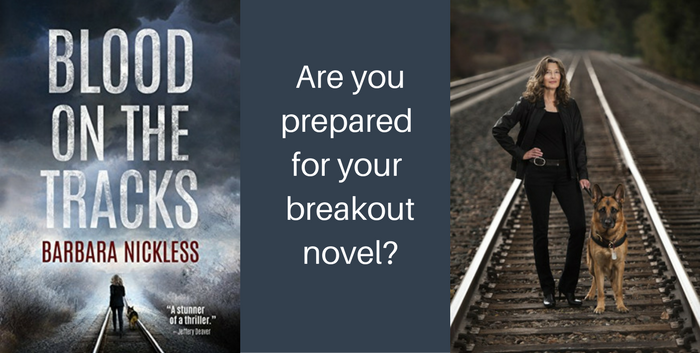
Today’s guest is debut author Barbara Nickless. (You’ll find a full interview transcript below.)
Podcast: Play in new window | Download | Embed
Subscribe Apple Podcasts | Android | RSS
Do you remember your first? Or maybe it hasn’t happened for you yet, but you know it will.
Of course, you know I’m talking about books here. That first time your book went live or hit the shelves, or however that first book was published.
Do you remember what you expected to happen? Was there a difference between what you expected and what you hoped would happen? What if your “hoped for” result was what really happened and your book was a breakout success? Or maybe it did? Were you prepared?
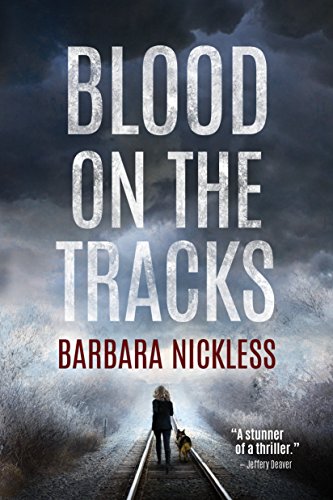 That’s what we’re talking about in today’s 36 minute interview with author Barbara Nickless. I had the opportunity to get to know Barb when my wife and I built her website. But that was before. Before the expectations crystallized and before she cautiously considered her hopes for her debut novel, BLOOD ON THE TRACKS.
That’s what we’re talking about in today’s 36 minute interview with author Barbara Nickless. I had the opportunity to get to know Barb when my wife and I built her website. But that was before. Before the expectations crystallized and before she cautiously considered her hopes for her debut novel, BLOOD ON THE TRACKS.
Links (Scroll down for transcript)
Buy BLOOD ON THE TRACKS at Amazon
Buy the Audio Book (or get it for free with a 30-day trial) at Audible.com
Visit Barbara’s website www.barbaranickless.com
Barb on Social Media: Facebook
Thomas and Mercer from Amazon Publishing.
The Camven Media website www.camvenmedia.com
Breakout Interview Transcript with Barbara Nickless
Stephen Campbell: Barb, what were your expectations with this first book of yours, Blood on the Tracks? What were your expectations, in terms of a first-time author?
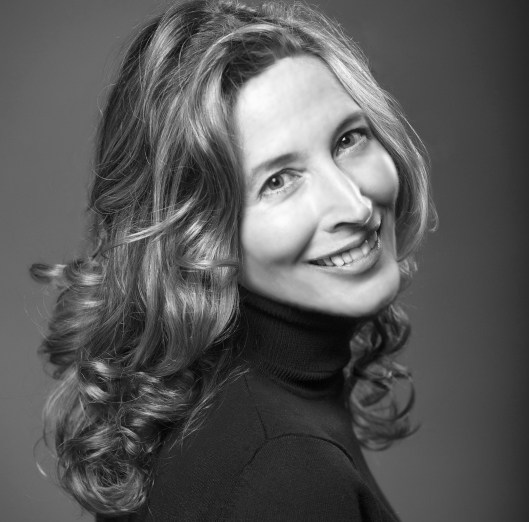 Barbara Nickless: I guess I had hopes and I had expectations, and there was a big gap between those. I didn’t really know what to expect, since this is my debut novel. I do have a lot of friends who are writers who are published, and I’ve seen what they’ve been through. I know it can be really tough; it can be quite a slog to get your name out there, to get much in the way of sales, so I was expecting to follow a more typical path for what I’d seen. In terms of my hopes, well, the sky’s the limit! We all hope we’re going to have a breakout novel.
Barbara Nickless: I guess I had hopes and I had expectations, and there was a big gap between those. I didn’t really know what to expect, since this is my debut novel. I do have a lot of friends who are writers who are published, and I’ve seen what they’ve been through. I know it can be really tough; it can be quite a slog to get your name out there, to get much in the way of sales, so I was expecting to follow a more typical path for what I’d seen. In terms of my hopes, well, the sky’s the limit! We all hope we’re going to have a breakout novel.
Stephen: Alright, let’s talk a little bit about what actually happened. I’m just going to give some numbers. The book was officially released on October 1st, but it was sort of pre-released a month before that, and we’ll talk about that. We’re recording this on November 1st, so it’s been released for a month, unofficially released for 60 days.
Barbara: Correct.
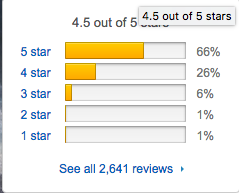
2641 on Sunday Morning
Stephen: As of two hours ago, I checked, and there were 2,318 reviews. Then while I was writing that number down, it clicked over to 2,319. So it might be 2,400 by now (Joint laughter). Who actually knows. But it’s a lot of reviews. A 4.6 average star rating; your book was #1 across all of Amazon for much of a month. Is that fair to say, without bragging on your part? (Joint laughter)
Barbara: That is true, yes. Amazingly enough.
Stephen: And a month after your official release date, you’re still in the top fifty, so I think we can conclude that this was a breakout success.
Barbara: I would like to think so. I’m think I’m still in a state of shock as to how this has gone, and I keep waiting for the other shoe to fall, or something to happen – for people to go,”oh, wait – this isn’t the book I thought” (Joint laughter). So far, so good.
Stephen: At the end we’ll get into the storyline of the book, but just a brief description, if you would, so people know what we’re talking about?
Barbara: It’s a mystery / thriller / police procedural. The difference, I think, from other police procedurals, is my detective is a railroad cop.
Stephen: Okay. And you address some interesting themes that we’ll get into. This is your first novel, but it’s not your first experience with writing, so I just want listeners to understand that you’re not just someone who was a restaurant manager or something and decided to write a book; you’ve been writing. You’ve done some technical writing, you’ve written articles, you’ve done a number of different writing tasks.
Barbara: I do, and I have two “trunk books”. There’s kind of a rule among writers that you have to have a million words before you’re any good. So I wrote two other novels; one actually came close in New York, but didn’t quite make it, and I backed way off. Then I decided that I really needed to get serious about this and get out there, and that’s when I wrote Blood on the Tracks. But a lot of writing experience went into this.
Stephen: Do you think you hit your million words?
Barbara: (Pause) I’ve always been bad with numbers. (Joint laughter) It’s entirely possible, yes. Certainly lots of hours.
Stephen: You and I talked for the first time about a year ago. We were introduced by a mutual friend, Deb Coonts, who is another wonderful author. She has two books coming out sometime later this month, speaking of switching genres; I’m looking forward to both of Deb’s books. But, when we first talked, you had the expectation of getting a book traditionally published, you had an agent, and your agent was shopping the book. Then when we talked a week or so later, you said “We’re going with Thomas & Mercer,” which is an Amazon imprint, for people who don’t know, and I was really, really excited! I would’ve been excited no matter who you said, but I was really excited that it was Thomas & Mercer, because I have such incredible respect for what they do.
Barbara: Yes, I remember that.
Stephen: Part of what goes on, is that Amazon knows more about selling books than anybody. They know more than the big publishers. The publishers have their expertise, but when it comes to actually selling books to the people that buy books, Amazon knows more than anyone. They’re able to market books in such a way, that a really good book will find an audience. That’s obviously what’s happened here.
Barbara: Yeah. Amazon is truly amazing. I think the market has changed so much, and it’s literally changing as we speak. Amazon has really honed in on that, and managed to capitalize on how readers are getting their books these days.
Stephen: You’ve never had a book traditionally published through a non-Amazon publishing imprint; you probably understand what the reporting is like for the big publishers, it comes sporadically.
Barbara: Yes.
Stephen: You would have no idea how many copies of the book you’d sold until six months after the release date. I’m assuming now you’ve got a pretty good idea – we’re not going to get into specific numbers now. Listeners of this show can look at numbers like reviews, and Amazon sales ranks, and do some math in their head and see that this has been an enormous success. Would it be any different for you if you didn’t have any insight, if you didn’t know what was going on?
Barbara: That’s a really good question, Steve, because it’s a two-edged sword. First of all, I’m extremely grateful that I can see how my book is doing, and get these regular updates (which I understand you can’t get with the “big five”). Where it’s interesting is what do I do with that information? As a businessperson, it’s good to know how your business is doing, but in terms of my ability to affect that, I’m still feeling my way forward on that. A little bit of that is “Yeah, I’m doing great,” or “gosh, I’d like to do better,” and not knowing quite what to do with that information. That said, I would not trade this for a different system – it’s actually phenomenal.
Stephen: What do you mean by “affect” your information?
Barbara: Well, you look at your rankings. As you mentioned, I was extremely lucky in September to be ranked number one – and naturally that’s going to drop off. So, is there anything I can do as an author to bring attention back to my book, or to increase my sales, and that’s where I’m such a newbie. I don’t know what I could do, or if I should even try, or if I should just be focused on writing my next book.
Stephen: Yeah, that’s a really interesting point. I think most guests of this show, many of our guests have been Indie authors, and I think most authors in general, find that it’s a challenge to market one book. It’s not a challenge for Amazon, but it’s a challenge for an author, to market one book.
Barbara: It is!
Stephen: Much of the marketing seems to cost as much as, or more than, the revenue you generate from the sale of the book, so unless you’ve got a follow-on sale to go on after that, you’re sort of spinning your wheels.
Baraba: Yeah, deciding where to invest those resources. At this point, a lot of us don’t really know what works. This is all so new, we’re still trying to figure it out.
Stephen: Right. You’ve got a lot of Indie author friends – what do they advise you?
Barbara: It’s really a lot of networking and what I call “boots on the ground”: going to writers’ conferences, meeting other writers, starting to build up a network of fellow authors, and then pulling in readers. There’s a big debate over newsletters versus blogs, or do both; trying to decide where to spend your time is hard. I’ve decided to go with what I enjoy. If it’s not something I enjoy, and nobody is saying, “Yes, you absolutely have to do this,” then I’m not going to do it. I’m going to focus my attention on what works for me, and hopefully the readers will follow.
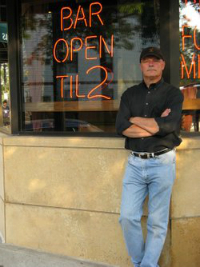
Mike Faricy
Stephen: One of the best pieces of advice that we’ve ever had on this particular show came from Mike Faricy, who’s a well-known, Indie mystery author. His entire marketing plan is, in a nutshell, write the next book, and make it better than the one before.
Barbara: (Laughing) Absolutely!
Stephen: It’s hard to beat that advice. It’s simply to follow, there’s no course to buy to make yourself better at it (Joint laughter) You just write the next book and make it better than the one before it.
Barbara: It’s certainly straightforward, I don’t know that it’s easy. (Joint laughter)
Stephen: Right! Well, the writing itself is hard, the plan is simple enough.
Barbara: Yeah, the plan is simple, but it’s certainly a little pressure there. We all want to grow as writers.
Stephen: Yes. The great thing about writing is there is no graduation; there’s no, “you’re done, you’re as good as you’re going to get.”
Barbara: Yeah, “You’re a nuclear physicist now, go out and do your thing.” That’s the lovely part; you keep working the craft and get better and better.
Stephen: You talk about going to conferences and things. I don’t know if you’ve had the chance to talk to Lawrence Block, but he’s a marvel!
Barbara: I have not, but I love his stuff.
Stephen: He’s in his seventies, and I know he’s retired at least once, but he just keeps writing; he just keeps publishing, he keeps communicating with his readers and fans. It’s amazing! You can do this as long as your mind is willing to cooperate.
 Barbara: Yes! It’s not like being a quarterback, if you’re in your thirties, you’re old. (Joint laughter)
Barbara: Yes! It’s not like being a quarterback, if you’re in your thirties, you’re old. (Joint laughter)
Stephen: Yes! You’re in Colorado, and a very well-known quarterback in Colorado had to retire, because he had his expiration date, in terms of age.
Barbara: Yeah, it’s sad.
Stephen: Alright, I’ve listened to the audiobook of Blood on the Tracks, which was marvelously done. Your narrator for that was Emily Sutton-Smith. Listeners of this show will know that I love a good audiobook; I love listening to audiobooks when I’m running or driving.
Barbara: I do, too.
Stephen: There were a couple thing I noticed about the audiobook. First, the paired pricing that Amazon does on books that are exclusive to Amazon, where, if you buy the book, you get a really great price on the audiobook. I think I paid $1.99 for the audiobook, which is amazing.
Barbara: Wow. Yeah.
Stephen: I know how much work goes into it, and how much money it costs to produce it. One of the things i find interesting is that Amazon has more information than we do. They know exactly what price points will generate the most revenue, and, presumably, the most profits – and they’ve chosen $1.99 for your book, at this time, if you’ve purchased another copy of the book, or even just got it through Kindle Unlimited.
Barbara: I didn’t know that, but I think this is wonderful news. It’s a great way to let people choose which medium they want to get their book on, and to go back and forth if they so choose; we can listen to the audiobook in the car, and pickup the book on our bedside table. I think that’s terrific. My brother is a Connecticut State entomologist, and a huge book-lover, and we’ve talked about that for a long time. We want a hardcover of the book we love, but we don’t want to carry a hardcover around, or try to prop it up in bed. We always hoped you’d have a chance of purchasing the audiobook at a discount if you bought the regular book, so I’m really excited about this.
Stephen. I’m at a certain age, and I can read a hardcover book in the sunlight, or during the day on a Saturday, but I can’t read them at night anymore, because I don’t want that bright of a light shining in the bedroom, and I can’t make it out. So, ideally, for me, it would be: buy one copy of the book, get discounted copies of the digital book, and the audiobook, and then you can just read it however you want to, I suspect we’re getting to that.
Barbara: I think so, too, going multiple platforms.
Stephen: There will be people listening, that say, “Oh, well, you published with Amazon, that means you don’t get to do cool things like have book-signings”. Well, because we’re Facebook friends, I’ve seen plenty of pictures of you at book-signings!
Barbara: (Joint laughter) Yes, it’s been fun! I had two big book launches, one in Colorado Springs and one in Denver, and was fortunate that a lot of my friends could come out and celebrate with me. Publishing with Amazon is very similar to publishing with any of the “big five,” or any other publisher. You can set the course that you want to do, and get your books wherever you want to get them, and do signings, or do whatever it is you want to do.
Stephen: Did you organize the book signings yourself, or did someone from Thomas & Mercer PR do that for you?
Barbara: They are happy to help in whatever way you want, and they’ll get books there for you. In the case of Colorado Springs, it was Hooked on Books who completely sponsored that event and arranged everything. Mary and Jim Ciletti were fabulous. Then, in Denver, I held it at the Denver Book Bar, which actually just made Buzzfeed’s Top 19 bookstores in the U.S.
Stephen: Oh, cool!
Barbara: It’s such a fun place. A wine bar and a bookstore – what more could you ask for? (Joint laughter)
Stephen: Was that fun?
Barbara: Oh, it was a lot of fun. But both of those events were terrific – great venues, great people.
Stephen: You seem like a very poised and confident person – were you nervous going into these?
Barbara: Oh, God. I’m so glad I have you fooled! (Steve laughs) A lot, if not the majority, of writers are introverts, which gets back to the whole thing of “How do I promote my book?” It can be really challenging and forces you out of your comfort zone, but I think that actually improves your writing, in a weird way. Was I nervous before those events? I was…tense. I don’t know if I was exactly nervous, but I was edgy. I’m not comfortable with the spotlight, so walking into that was like, “can everyone please look the other way and talk amongst yourselves?”
Stephen: (Laughs) What have you learned from talking with people that have read your book? What have you learned about the book that you may not have known?
Barbara: What I’ve been amazed at is two things, actually. First of all, how thriller-like everyone found the book, and couldn’t put it down. I never in a million years thought that I was writing that kind of book. I was just plugging along, doing my thing, and following what felt like the natural story arc. The other thing that has surprised me is the emotional response. People are really responding to the book on an emotional level. I’ve been really gratified to hear from a lot veterans, or the families of veterans, thanking me for putting it so people can understand what it’s like to suffer Post-Traumatic Stress Disorder.
Stephen: Let’s talk a little bit more in-depth about the story for listeners, because it really does grab you by the throat, emotionally, very early on, and it just doesn’t let go.
Barbara: Oh, thank you, Steve. My detective, in addition to being a railroad cop, had served in Iraq in the Marines in Mortuary Affairs. Their job was to go out and collect the dead bodies after an Improvised Explosive Device (IED) or a gunfight, or whatever it had been, and bring those bodies back to Mortuary Affairs and process them for return stateside. Naturally, she’s going to be haunted. If you’re working with the dead like that, and you’re seeing the results of war on people, you can’t help but bring that back. She’s carrying that, and then she has a K9 partner, Clyde, and he was a military working dog, and he’s got PTSD, as well, so they’re quite the pair.
Stephen: They are. So many of us have relatives or friends that have served overseas and have gone through something traumatic. That’s one of the things that got me right away, because I know a few people that are dealing with specific issues that are so similar to what Sydney is going through. You talk about “haunted,” and that really resonated with me; I suspect it does with a lot of readers.
Barbara: It seems to. The other response I’ve gotten is for people who have no idea what our vets are going through, or, indeed, what any victim of trauma can suffer. They’ve been very appreciative that it’s opened their eyes to understand, and maybe helped people be more understanding of what they’re going through.
Stephen: Let’s take a step back in time, about a year, to when you actually began. The book was written, you had a publisher, and you had a finite period of time to get ready. What did you do to get ready?
Barbara: Not enough. (Joint laughter)
Stephen: I bet it felt like enough!
Barbara: I really had no idea what I needed to do, or I’d had friends advise me, “do this, do that”. I was thinking, “well, my book’s not going to be that big of a deal, I won’t really need to worry about this.” The smartest thing I did was to get a website. I would advise everybody to start with that, because people need a place to find you once they’ve found your book, or if they’ve heard about it and they’re not sure where to start. So create a website.
Stephen: Did you find anybody good to do that? (Laughing)
Barbara: There was this one guy, Steve Campbell, and I’d heard from another very successful writer that he was fabulous. And you know what? He is. (Joint laughter)
Stephen: Wow, I may link to his site in the show notes. (Laughing)
Barbara: I think that’s a good idea! I’ve been recommending him to my friends. The website he created for me is absolutely beautiful. I’m just thrilled. I had a lot of my writer friends who knew what readers would be looking for in a website go in and take a look at it, and say it was terrific and very professional. I’ve been very thrilled, Steve.
Stephen: Alright, that was one thing you did, and thank you for the plug! What else did you do to get ready?
Barbara: Yeah, not a lot. The one thing I wish I had done was create a lot more blog posts. Do that while you have time, before your book is out there and you’re in this sort of reactive mode, instead of proactive. You can get a lot of blog posts created, and then you’ll have something to start putting up on a regular basis without having to think about it.
Stephen: I think this is an important point. You had all this time where you could’ve done this, and probably in your mind, you’re thinking, “I’ll wait until it gets closer to the time that the book comes out,” but as it gets closer, things start to ramp up and you have less time. It’s really less effective than having done it before. If you’re out there listening, and you’re thinking, “I’ve got a book coming out in six months, what should I be doing now?” As long as you have a website, you can start writing some content. That content will help Google to help readers find your book.
Barbara: It will, yeah. And the content of your posts, of course, goes well beyond blogs. There’s creating a press kit, and different versions of your biography; if you can have all of that done before your book even comes out, if you really get your ducks in a row, you’ll appreciate it. Because you’re right; you just don’t have the time to give to that. I would recommend getting other articles written, too, that pertain to your novel. For example, right now I’m getting a lot of requests to write about my research, I’m getting requests to write about K9 partners, and I could’ve done a lot of that beforehand, had I anticipated that there would be a demand for that.
Stephen: You mentioned different versions of your biography; what would be the purpose of that?
Barbara: I do a short, a medium, and a long, because it depends on the outlet, on what they want. But this way, you’re prepared. For example, I just spoke at Bouchercon. They want a biography that’s fifty words or less. Others will want something much longer or in-depth. If somebody is going to be interviewing you, they won’t necessarily share that longer bio, but they’ll want to know enough about you that they have some talking points.
Stephen: Great, thank you. That’s good advice for anybody who is putting together a website out there. What about your email list? I know you put together an email list; do you feel like you did enough to have that in place? Did you get any value out of setting up your email list ahead of time?
Barbara: Absolutely. That was at the advice of my web designer, thank you. I have not created a newsletter yet. That is another thing I suggest people do, is start thinking about what your newsletter is going to look like, what your theme is going to be, and what you’re going to include in there. Thank heavens I did have a way for readers to sign up, because they’re doing that, and I didn’t have to think about that piece of it, it’s done automatically.
 Stephen: One thing I noticed, at least in the version of the book that I have, is that there is no link to your email signup form anywhere in the book. For most Indie authors, they would look at that and see that as a wasted opportunity. Was that something that you just weren’t allowed to do, or Amazon just didn’t think to do it for you, or what?
Stephen: One thing I noticed, at least in the version of the book that I have, is that there is no link to your email signup form anywhere in the book. For most Indie authors, they would look at that and see that as a wasted opportunity. Was that something that you just weren’t allowed to do, or Amazon just didn’t think to do it for you, or what?
Barbara: I don’t know what Amazon’s thoughts are on that, it did not cross my mind, so that’s a really good point. I think that would be very helpful. I’ve had some people manage to find me and send me emails saying “I didn’t know how else to reach you,” or “it took me a while to find your website”. You never know who your audience is, or how tech-savvy they are, or if they really know how to do a Google search. I think that would be really helpful, that’s a great idea.
Stephen: I actually finished a book last night, and at the end of the book, we’ve all seen this: “Click here to sign up for my email list.” I just make it a practice now, if I enjoy the book, I click that link and sign up for the email list, because I want to know when the next book comes out.
Barbara: Oh, that’s nice.
Stephen: I don’t know whether it would be possible for you to update the author notes in the book. It would probably be worth talking to someone at Thomas & Mercer and asking them if you can do that.
Barbara: Yeah, that is an excellent idea. I will do that.
Stephen: We’ve been offering some advice to authors who might be going through the same thing as we’ve been going along. If we’re not talking to people who are in the exact situation you are, or are maybe a year away from being in the same position that you were in a year ago – someone who is halfway through a book, or is about to finish a book – what would you advise them, specifically, to do?
Barbara: Start now. Start that website and start creating content for it. If you are writing a series, go ahead and start the second book. That was a mistake I had, because I thought, “I’m not going to waste my energy on a second book if the first book isn’t going to sell.” Again, even if the first book doesn’t sell, worst-case, you’re getting closer to your million words. Plus, at some point, if a different book sells, you might be able to go back and do this as a series. The website, start the second book, even if it’s not a series. That’s all we can control, right, is our own writing – so write that second book. And build content.
Stephen: And you’re working on the second book now, right?
Barbara: I am.
Stephen: And you’ve got a title and everything!
Barbara: I do! Well, I’ve got a title, I don’t know if I’ve got everything. (Joint laughter)
Stephen: Yeah, “everything” is a broad term isn’t it?
Barbara: I wish, Steve, that were true! There is a title, it’s called Dead Stop, and I’m hard at work on getting that book turned in on time.
Stephen: And that’s another Sydney Rose Parnell book?
Barbara: It is. It will continue Sydney and her K9 partner, Clyde, and also Detective Cohen, who’s with the Denver Major Crimes Unit. Those three characters, and a few minor characters will be returning, but there will be lots of new characters, as well.
Stephen: Alright. One thing I’ve noticed in reading your books is the amount of research you must do. Do you have this lust for research?

Barbara researching at the FBI Citizens Academy
Barbara: I do. I do. I’m such a complete geek. (Joint laughter) I’ve always loved learning new things. As much as I love writing, what writing really does is gives me an excuse to do research. I love book learning, and I love actually getting out into a field and learning things that way. It’s been quite an adventure, getting to do all the things I’ve gotten to do in my life.
Stephen: Yeah, and in this book, you’ve got PTSD, which I’m sure will be a theme of the series, and you’ve got trains. There’s a lot to learn, and a lot to get right. (Barbara laughs) There’s a lot that you could get wrong, if you do the wrong kind of research, or do slapdash research.
Barbara: Yes. That was my biggest fear, was getting called out for making mistakes. I do have a gun error in the book, and I’m very embarrassed about that. I switched from a revolver to a pistol for one of the characters, and I missed changing it in one place. I’ve heard from people about that – they’ve been very kind about it – but I’m working to get that fixed.
Stephen: That’s funny, because at every mystery conference, that’s something you hear in at least one session is, “be sure you get the gun stuff right, because people really know their guns.” (Laughing)
Barbara: Especially if you’re a crime writer, right?! They expect you to get this right! And I knew better! It’s not that I didn’t understand the guns. Any writer has been through this, say they change a character’s name, and they just missed it in one place? It was a case of that, and you do your best and then you move forward. There’s going to be mistakes.
Stephen: Of course, yes. What is your research process? Do you try and do all the research first and then write, or do you write and then say, “I need a bit more information about this…widget,” and then do more research?
Barbara: Yeah, that’s it exactly. I try to do the research up front, because so many times, the story falls out of the research. You say, “Oh, I didn’t know that you could do that with a train!” or, “I didn’t know military working dogs were capable of doing that sort of thing.” So your story sort of comes out of the research, but it’s a never-ending thing. Actually, when I finished Blood on the Tracks, and I sent it to my agent, I still had a huge stack of books that I wanted to get through, and a whole list of people I wanted to talk to, and I’ll never be able to do it all.
Stephen: (Laughing) There is a fear that if you do too much research, you’ll never get anything written.
Barbara: Exactly! (Joint laughter)
Stephen: Barb, where is the best place for people to connect with you online?
Barbara: Please go to my website, www.barbaranickless.com and you can send me email through that, you can sign up for my newsletter, and you can also get contacts to social media. I love to hear from people!
Stephen: Yes! And check Barb’s Facebook page, and like Barb’s Facebook page. She would love that!
Barbara: That would be wonderful!
Stephen: That is something that came late to the party.
Barbara: Thank you, Steve! That was one of those things I didn’t get done. “Oh, yeah! Facebook Author page!” It’s a struggle for a writer; I started getting friend requests on my personal page, and I still haven’t decided how I want to handle that. I try to keep personal and business separate.
Stephen: It’s a challenge. Actually, last week’s Author Biz show, we talked about that. The advice that we got in that show is to really try to direct people from your personal page to your author page, and to keep those separate as possible, for many reasons. Chris Syme, who was the guest, explained some of those reasons during the show.
Barbara: I’m going to listen to that, thank you.
Stephen: You and I have talked a number of times over the course of the last year, but this is the first time we’ve ever recorded it! It’s been a pleasure to speak with you in this way, and to hear more of your story.
Barbara: It’s been a lot of fun, Steve, thank you!
Stephen: Thank you for listening! You can find links to show notes and everything we mentioned, including Barb’s wonderful book, her website, her email list, her Facebook page, and all of this is available at www.theauthorbiz.com If you’re out there, driving around, you don’t have to remember anything; we’ll have links to everything. Thanks again for listening.
Transcription provided by Jen McDonnell ([email protected])
Thanks for Listening!
Thanks so much for joining me again this week.
If you enjoyed this episode, please share it using the social media buttons you see on the left of the post.
Also, please leave an honest review for The Author Biz Podcast on iTunes!
Ratings and reviews are extremely helpful and mean a great deal to me. They matter in the rankings of the show, and I read every one of them. If you’re not sure how to leave an iTunes review, you can follow the step-by-step instructions here.
And finally, don’t forget to subscribe to the show on iTunes or Stitcher to get automatic updates.
Thanks to Barbara Nickless for joining us this week!
Please note, Amazon book links on this page are affiliate links. You’ll pay the same price for the books, but I’ll earn a small commission.

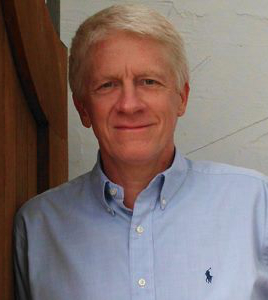 Before getting into the business of writing I spent twenty-five years in the technology business as a financial guy, and then as a serial entrepreneur. I know what it takes to start and run a successful business.
Before getting into the business of writing I spent twenty-five years in the technology business as a financial guy, and then as a serial entrepreneur. I know what it takes to start and run a successful business.
Great Interview, Steve and congratulations, Barbara! This sounds like a wonderful book on many levels and is now on my TBR list.
Thanks, Shannon! You’ll love the book.
Stephen – I’ve been listening to your podcast for several months (love it!) and was pleasantly surprised to see this interview with Barb. She and I met at Thrillerfest and have become social media buddies ever since. I’ve already read her novel and it is fantastic! Thanks for the inspiring episode!
Hi Jerri – First – thanks for listening on a regular basis, I REALLY appreciate it and I’m glad you enjoyed this one. Thrillerfest is on my list of things to do every year but I haven’t made it yet. Do you go to any other conferences that you’d recommend?
Thank you, Shannon! I hope you enjoy the book. And thank you, Steve, for asking such great questions.
Hello Stephen. I’ve been listening to a show for a few weeks, catching up on old episodes. The advice from most of the guests is solid, especially for independent writers. However, some of Barbara’s advice wouldn’t help writers starting up. Writing blog posts is not what forges connection with readers, since they don’t like or love this author for their blogs, but their books. It’s important to have a website, but the purpose of that website is just to have your email, a signup list and to serve as a place, along with Facebook and/or other social media, for readers to connect with you. It would have been more helpful to talk to Barbara about how she made it to be accepted by Th & M, any advice she could give new writers on that.
Thanks for the great shows, blessings and enjoy your weekend,
E
Thanks, Ethan – Barbara connected with Thomas & Mercer the old-school way, through her agent.